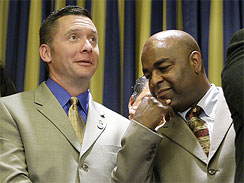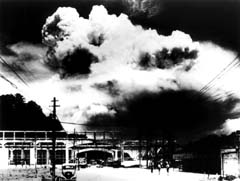
Sergeant James Crowley (Cambridge, MA)
Stupid, belligerent, violent
One of the advantages of not being even remotely connected with electoral politics is the fact that, unlike, say, Barack Obama, I have no votes that I need to collect from timid white moderates
, and also no sniffy self-important special interests or political respectability rackets that I need to appease. I don’t need to care what professional blowhards or doughfaces think of me, or whether or not a white police sergeant in Massachusetts, and all his buddies in the Brotherhood, are disappointed
in me. So while Obama may feel compelled to re-calibrate, I have no reason to back off out of concern for sensitivities of conventional-delusional political thinking. So if he won’t stand by his own perfectly reasonable comments, I at least am free to say, without qualification or calibration, that when Sergeant James Crowley cuffed, arrested, and imprisoned Henry Louis Gates on his front porch, for daring to holler at a cop inside his own house, Sergeant James Crowley was damn well acting stupidly
. As a matter of fact, he was being stupid, belligerent, and violent towards an innocent man who he had absolutely no right to arrest.
Of course he was. He putatively showed up to investigate a possible burglary (in the middle of the day?) when a neighbor called in a report that two black men were forcing open the door to the house. (Gates had just gotten back from a long trip to China and found that the door was jammed, so he asked the man who drove him home — who was also black — to help him shoulder it open.) The cop showed up, demanded that Gates step outside, entered the house without a warrant and without permission when Gates refused to step outside, demanded identification while refusing to give his badge number, and when it was conclusively demonstrated to him that Gates lived there and was, in fact, breaking in
to his own damn house, he and his gang brothers ambushed Gates on his front porch and arrested him for being loud and tumultuous
in his own house where he had a right to be. Quite in spite of the fact that, even if you grant for the sake of argument every single detail of the cop’s own version of events, once it was clear that Gates lived in the house he had supposedly been burglarizing, Sergeant James Crowley had absolutely no moral or legal basis whatsoever for remaining one second longer, or for arresting and imprisoning Henry Louis Gates, since raising your voice to a police officer is not a crime, and neither is calling him names (whether those names are fair or unfair), and neither is hollering loudly and tumultuously inside your own home. Shoving your way into a man’s house to hassle him, and then arresting him for these non-crimes when he gets upset, is a stupid way to handle a situation when you’re not sure what’s going on; the cuffing, arrest, and jailing were also an act of physical force carried out against an innocent man by an entitled bully who had no right to be there but who has no problem with using intimidation and violence to get his way.
And, as it happens, in this case, his stupidity, intimidation and violence took the specific form of stupid, belligerent, violent racism. As they so often do when government police (especially, but not only, white government police) interact with black men and women, even black scholars in their late 50s who rent their houses from Harvard University and walk with a cane.
And the opinions of the usual bellowing blowhard brigade to one side, it actually doesn’t matter one bit whether or not Henry Louis Gates could or should have been more calm or cool or collected under the circumstances; whether or not he actually should have been grateful
for being hassled in his own house by a sworn officer of the law in the name of Service and Protection; whether or not the names that he called this stupid, belligerent, violent cop were in fact fair or unfair given the situation; or whether he ought to have changed his behavior or his attitude in the least. Henry Louis Gates’s behavior and attitude aren’t in question; whether or not he was acting as he ought, Sergeant James Crowley had no reason to be there and no justification and no excuse for arresting him or hauling him off to jail. Nothing that Gates could possibly have said, under the circumstances, would have made the arrest and imprisonment justifiable or even excusable; and when legally-privileged agents of the state go around attacking innocent men, I’m a hell of a lot more worried about that than I am about policing the conduct of the victims of their aggression and coercion.
All this should come as no surprise to anyone who has ever dealt with government police, or knows much of anything about the world around them. Of course, that rules out politicians, media commentators, and other professional blowhards, who rarely talk to anyone but each other and have very little experience of being on the business end of government policing, or much of anything other than their own self-important power games. But the rest of us know perfectly well that cops often act with tremendous arrogance and entitlement, especially when they feel uncertain or threatened by the situation that they are in (that they have, in fact, been trained very explicitly to stay in control of the situation
by any means necessary); that they also tend to view men and women of color, regardless of class, and poor white men and women, too, as more disruptive or more threatening than affluent white men and women; and that either conscious or subconscious racial profiling is the order of the day in virtually all street-level urban policing. It is also both obvious and widely known that cops routinely use incredibly vague chickenshit charges like disorderly conduct,
even when it is absolutely obvious that none of even those incredibly vague criteria actually apply, in order to shove people around, intimidate them into complying with arbitrary orders, or to humiliate and punish those who do not comply. Even when the charges are sure to be dismissed, you can beat the rap but you can’t beat the ride,
and all that. Anyone whose understanding of policework is not basically mythological in nature, or is not constrained by non-rational political imperatives, knows these things, and should be outraged, but not even remotely surprised, that all this went down.
And the fact that a bunch of cops get indignant about the offense to their honor by being called out, for once in their professional lives, on their stupid, belligerent, violent behavior doesn’t change the fact one bit. What happened is typical, damned typical; the only thing atypical is the political and media connections of the victim. And Sergeant James Crowley, as a sworn police officer, was just living up to the standards of stupidity, belligerence, violence and racism that his gang brothers have set. You might be tempted call stupidity, belligerence, violence, and racism the occupational disease of government police in America. If not for the fact that it is their occupation.
See also:
- Brian Palmer, Slate (2009-07-22): Do Police Officers Have To Identify Themselves? And other Henry Louis Gates Jr. arrest questions, answered by the Explainer.
- Lawrence Bobo, The Root (2009-07-21): What Do You Call a Black Man with a Ph.D.? The Skip Gates arrest shows how little some features of the national racial landscape have changed over time.
- Leonard Pitts, Jr. Seattle Times (2009-07-24): The Henry Louis Gates Jr. incident: Sometimes, they just don’t see you
- Macon D., stuff white people do (2009-07-21): think they can put themselves in the shoes of black people
- Randall McElroy, The Distributed Republic (2009-07-21): Henry Louis Gates, Jr. vs. the Cambridge PD
- Lila Ravija, The Mind-Body Politic (2009-07-21): Police Arrest Harvard Scholar In House
- Sheldon Richman, Free Association (2009-07-24): For Gates and Against the Police
- Gary Chartier, LiberaLaw (2009-07-24): Show Some Respect







